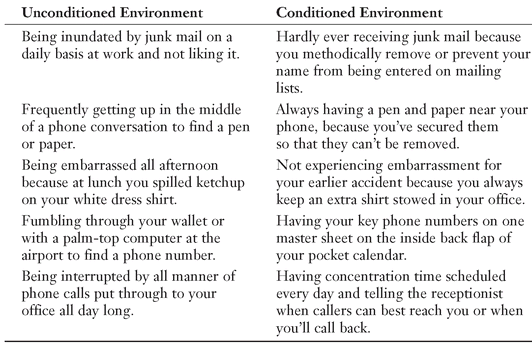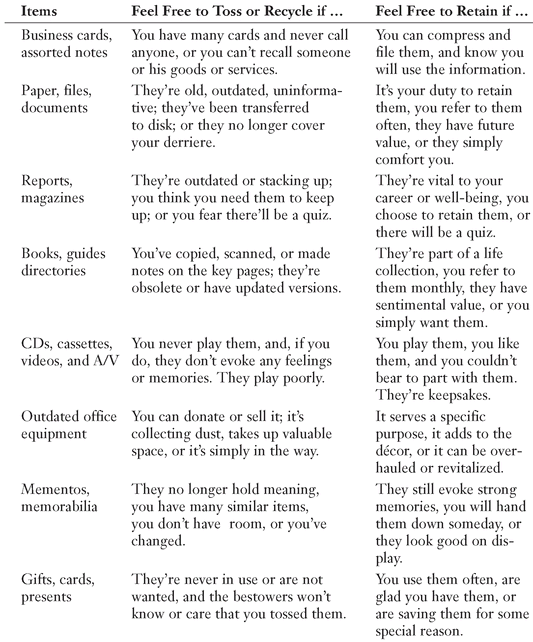Chapter 6
Your Desk, Your Office, Your Career
In This Chapter
• Your work environment
• Rule your desk
• A new set of commandments
• Love your surroundings
Let’s face it, your productive work life is finite. You will only be able to work for so many years at such-and-such a pace, and then one day that will end. When it comes to getting things done, taking control of your immediate environment works wonders.
This chapter is all about the direct connection between how you manage your desk and office and how that ultimately impacts your career.
Filing and Organizing Effectively
Practically speaking, much of getting things done comes down to how well you’re able to retrieve what you need, and much of that adds up to a single concept: filing.
Filing is a non-glamorous tool for getting and staying organized. Filing involves allocating information and materials into their best home, for now. What do you need to be a good filer? Clear objectives and the space to put a chair in front of a filing cabinet. If you fear that filing means you’re becoming a caretaker, remind yourself you are taking care of items or information that you deem to be important. If it isn’t important, don’t save it. If it is important, file it with gusto.
Conditioning your environment is a crucial step in organizing and filing effectively. This means that you arrange, stock, and maintain such spaces in a manner that supports your efforts. For example, organizing a desk drawer initially takes time and may be slow going. Thereafter, finding what you want in the desk drawer is simpler and faster.
If you avoid organizing the drawer all together, always have things strewn about, and go on a “hunt” each time you need to find something, in little ways you’re hampering your productivity potential rather than devising a system that will support you every time.
Managing the Beforehand
With the vacant space you have created, you now have a clearing for the things that you’ll be receiving. These include new policy memos, articles you want to save, meeting notes, and course information that you want to review at a later date. The items may be different for each person. The important point in an over-information society is to take control in advance—manage the beforehand—as opposed to dealing with the aftermath of too much information.

Word Power
Managing the beforehand means to prepare for something in advance of a need, such as to prepare your files in anticipation of new items that are coming. Rather than having files and cabinets filled to their brims with information, strip them of all excess materials so that you have some vacant space.
Once you develop the habit of clearing space in all the compartments of your life—your desk, your car, your closets, etc.—you accomplish many things: you demonstrate to yourself that you do have enough space to manage your career and conduct your affairs, and you keep in a ready state to handle what is next rather than trying to figure out where to store things or how to create ad hoc piles.
The table below presents eight typical mismanagement scenarios in the left column and corresponding preventative measures in the right column.

Conditioning Your Office
Conditioning your work environment, coordinating the arrangement of physical spaces in your career in an anticipatory, supportive manner, works well on many levels. You can apply the principles to your entire office. Whether yours is a corporate or home office, you can discover how to gain greater balance. Obviously, you will have more leeway if you are self-employed, or the “boss,” but the principles work pretty much the same.
If you need them, room dividers and sound barriers are available in a wide variety of shapes and sizes and can improve upon any existing sound barriers. The gentle, rhythmic “white noise” of a small fan’s motor serves as a sound buffer to many of the sounds that may distract you. Maybe you want a couch for quick cat naps during the day. The quality and ambience of your work space works best when it demonstrates the quality and ambience of your life or how you would like your life to be.
The table below presents five examples of working in an unconditioned environment and corresponding antidotes.

Your other environments, including your car, briefcase, and remote work station, each have a pronounced impact on how you get things done. To ensure that your home environment supports your sense of balance, don’t allow ad hoc outposts to build up. Take the trip receipts out of the folder right after the trip. Adopt supportive docking and unloading techniques. Always bring important paper items, such as mail, office work, tax receipts, warranties, and other purchased items to their final destinations—that is, bring them to your administrative outpost for processing and integration into your organization system.
The more you are able to keep flat surfaces clear—your desk, tables, shelves—the greater your ability to manage the flow of items in your career, deal with them capably, and move forward. You experience a sense of balance.

Factoid
The London subway system was experiencing a growing problem of unwanted vandals and thieves in their tunnels. So they devised a plan to play classical music and opera, such as Vivaldi, Mozart, and Pavarotti in the effort to make unwelcome visitors uncomfortable with the subway environment. Studies have shown that this type of music is unfamiliar and unacceptable to the thugs who hang out in the subway. Making them miserable with music they don’t enjoy will drive them away.
The 10 Commandments of Deskmanship
Keeping in control of your desk is divine. Speaking of which, if Moses himself climbed to the top of Mount Sinai today, considering all the desks that are hopelessly disorganized, here’s what he might bring back:
1. Thou shalt clear thy desk every night. Yes, every night.
2. Thou shalt continually refine what goes on thy desktop.
3. Thou shalt not use thy desktop as a filing cabinet.
4. Thou shalt predetermine what belongs inside thy desk.
5. Thou shalt keep 20 percent of the drawer space vacant.
6. Thou shalt furnish thy surrounding office to support thy desk.
7. Thou shalt take comfort when at thy desk.
8. Thou shalt keep clean thy desk and thy surrounding area.
9. Thou shalt leave thy desk periodically.
10. Thou shalt honor thy desk as thyself.
It’s Divine to Refine
Let me expound upon a couple of the essentials:
• Furnish thy surrounding office to support thy desk with familiar and comfort inducing objects, for example, plants, pictures, slogans, and anything that supports your efforts.
• Clear thy desk every night. Yes, every night. Joe Sugarman, in his book Success Forces, explains the values of clearing your desk every night. He says it essentially forces you, the next morning, to start on those things that are truly important and not to continue with what happens to be cluttering your desktop. I practice this and find that it pays off.
Keep clean thy desk and thy surrounding area. This is crucial if only to maintain the perception of being in control. Also, take comfort when at thy desk. In other words, your desk should be a comfortable place for you, not a war zone.
• Continuously refine what goes on thy desktop. What you used to keep on your desk because it was convenient and useful may no longer be so. Also, continuously assess different items that support your desktop arrangement, such as computer trays, hanging lamps, and swivel mechanisms to conveniently move equipment as needed.

Factoid
Researchers at the University of Texas conducted a study that found people with cluttered offices get very little done, are less efficient, less organized, and less imaginative than people with clean offices.
Always remember, keep 20 percent of thy drawer space vacant—in an information-overload society, your desk will not serve you if all available compartments are filled to the brim. Cut back now and acknowledge what is coming; i.e., manage the beforehand to stay in control.
The Perils of a Messy Desk
In the over-information era, your desk needs to be a comfortable place for you. What does it say if your desk is continually a mess? You met the din, and the din won? Beyond the logistical problems of not being able to find things, a messy desk sends the wrong message to those who might otherwise include you on big, important projects!
Personal organization is fundamental in the quest to get things done and disorganization is costly. A cluttered desk reflects poorly on one’s efficiency and capacity for clear thinking. If you want to stifle your career, having a messy desk will help. When your desk is a mess, it appears that you’re not in control, whether or not you actually are!
A messy desk makes it look as if you cannot handle your responsibilities. When a supervisor is delegating assignments, you may be passed over out of the fear that the assignment will go into a pile and never find its way out. In working with others, appearance matters and your desk is as important as appearing professional in formal business meetings. Besides doing good work, to make a positive impression on co-workers and bosses, take control of your desk and office environment.
Dyna Moe
If your situation currently appears hopeless, at the least establish a drawer where you can temporarily house what you want out of sight, and keep the drawer closed.
Getting Things Done with Grace
I often have readers and audience participants ask me questions about taking control of their work environment. The issue behind such queries? How to get things done throughout the day with greater grace and ease.
Q: I may be responsible for how organized I am each day, but I don’t feel that way. There are things that I have to do that seem to throw everything off. How do I increase my feeling of control and sense of responsibility for how my space is arranged?
A: Begin to recognize behavior that you practice that is comfortable but outmoded and time consuming; ceremoniously (but not strategically) arranging the items on your desk, over-surfing the web, and dozens of other habits qualify here.
Q: Many days I am in control for at least most of the morning, sometimes even into the afternoon, but then all of the sudden, like a train derailment, everything seems disorganized and out of control.
A: Take mental pauses throughout the day, particularly as new developments occur. The best-laid plans often go astray, and those who are able to maintain order know when to let go of one activity and redirect their focus toward another.
Being in control often is more related to how you feel about a situation than the presence of evidence. Ten minutes before the end of the day, if your boss springs a one-hour assignment on you that must be done immediately, you can regard this as a major intrusion in your day and an affront, or you can see it as a professional challenge or an opportunity to demonstrate your overall value to your company.
Make a note of the times you have taken on such challenges and bring them up particularly at raise times. Also, before, during, and after handling the late assignment thrown on your lap, keep considering the many benefits of completing it. These include learning something new, practicing maintaining grace under fire, and serving as a reminder for you to discuss this type of situation with your boss so that it doesn’t happen too frequently.
Q: How do I determine what items I need on or around my desk?
A: Surround yourself with what supports you! When deciding whether to have a particular item in your office, ask yourself, “Does this item deserve prime real estate?” This includes those gifts from family and friends. In most cases, hold on to the love and let the gift go!
Q: Are there any early warning signs that indicate when I’m heading for disorganization?
A: Anytime you start stacking horizontal piles on your desk indicates that you are operating in a malfunctioning mode. If you find yourself perpetually five to ten minutes late for meetings and always handling activities up to the last minute before turning your attention to what is next, you’re leaving yourself wide open for some anxious moments. If you don’t give yourself enough space—physical space—to handle a task, you are also likely to feel a bit disorganized.
If it helps, for each item that crosses your desk, ask these fundamental questions:
• Why did I receive it? Should I have received this?
• What’s the issue behind the document?
• Why keep this? (Is it vital? If it will be replaced soon, I don’t need it.)
• How else can this be handled? Can I delegate it?
• What will happen if I don’t handle this?
At every juncture, avoid playing the victim, believing that circumstances of others cause you to be disorganized while not acknowledging your participation and willingness to be a victim. Take ownership; that is, lay claim and accept responsibility for what occurs in your career. You’ll go further and faster, and you’ll get more done.
The table that follows serves as a quick guide to keeping your desk and office in order.

High Accomplishment Through Shelf Management
Shelf management and self-management are not dissimilar! Your shelves are generally home to items you’ll probably use in the next two weeks, items too big for your filing cabinet (or collections of such items), current projects that you’d rather not file, and supplies (that ought to go in supply cabinets).
It makes sense to shelve the following: items that you might use within a week or two include reference books, directories, books, phone books, manuals, instruction guides, and large magazines. Items that are too large to put in a file cabinet might include books, large reports, and any item that is part of a series. If you’re working on a task or project that requires a variety of materials and they can be neatly housed on your shelves, go ahead—as long as the project has an end, and these items don’t linger there forever.
What doesn’t go on your shelves? Anything that belongs in a supply cabinet! Now you know.
The Least You Need to Know
• How you previously got things done or what worked yesterday will have less and less value with each passing day.
• When it comes to getting things done, taking control of your immediate environment works wonders.
• Develop the habit of clearing space in all the compartments of your life and you can accomplish many things.
• In the over-information era, your desk has to be a comfortable place for you.
• Surround yourself with what supports you! When deciding whether to have a particular item in your office, ask yourself, “Does this item deserve prime real estate?”
..................Content has been hidden....................
You can't read the all page of ebook, please click here login for view all page.
